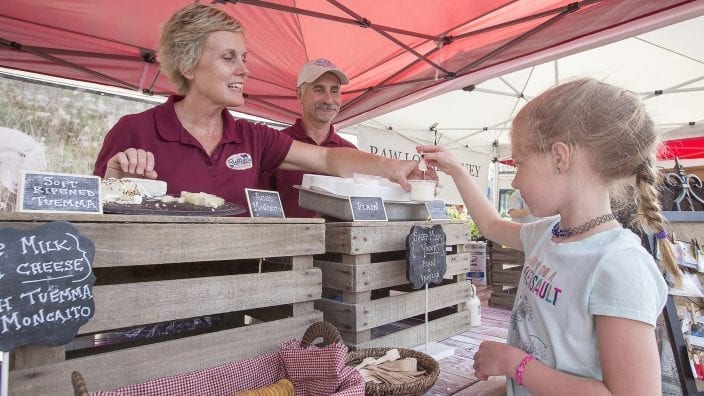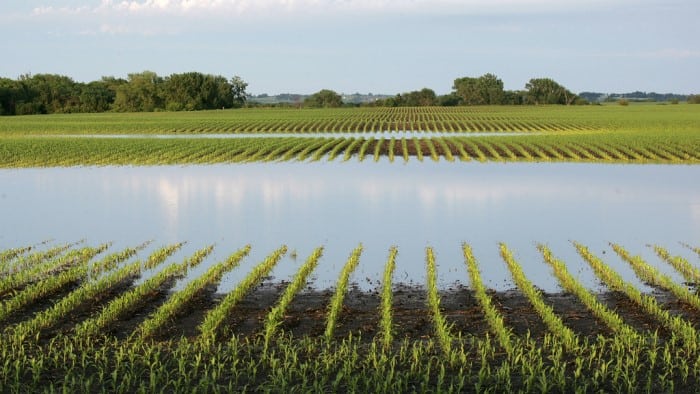Farmer’s Guide to Trucking Regulations available to Ohio Farm Bureau members
The guide includes a farm driver checklist, overview of state and federal regulations and exemptions, CDL qualifications and more.
Read More
Hope you enjoyed your July 4th and were able to have some down time with family and friends!
What a growing season we’ve had so far this year! An average June in Trumbull County will see about 4 inches of rain, but this year, we had just less than 7 inches here at the office. That’s almost double the amount of rain compared to a “normal year.”
If you drive around and see flooded fields – or your yard – it’s because our soils are saturated and are not able to hold much more water when we get a heavy rain. Not only did we get more than average rainfall, but the rains were also perfectly spaced so that by the time the soil was almost dry enough for tillage, planting, mowing or fertilizing, it would rain again. It’s been frustrating.
There is a lot of ground in Trumbull County that has not been touched this year, and many fields probably won’t get planted. Corn is a longer-season crop, so even if it was planted this late, it would not yield enough to cover the cost of planting. Soybeans, on the other hand, are a shorter-season crop and there may still be time to plant, depending on the maturity. But if the wet weather persists for another week, it will be too late for most soybeans, as well.
For those looking to get a crop in this year, another option would be to plant some late-season field peas. This comes with some risk as planting time perfectly coincides with most of the field pea disease cycles. With short windows of dry weather, some farmers had to plant under less than ideal conditions. A seed in wet ground still has a better chance of growing than in the bag.
Planting in wet soil is commonly referred to as “mudded in” and can result in poor stand emergence, stunted plants and nutrient deficiencies. When a planter creates a furrow for the seed, if the soil is too wet, it will smear the soil on the sides of the furrow. This smearing action can compact the soil preventing plant roots from penetrating this hard layer, which results in roots that can only grow laterally within the furrow. Plants in this situation can’t access nutrients outside the furrow and are anchored poorly in the soil. “Floppy corn” is a symptom of being mudded in as the plants will simply flop over one the plant is too big for the root system.
We all know the importance of water for growing plants, but too much water can actually drown plant roots and prevent nutrient uptake. Just like animals, plants need oxygen to survive and grow. When too much water is in the soil, it fills up the air pockets between soil particles that would normally provide oxygen for the roots. This shuts down much of the plant’s metabolism and results in less uptake of nutrients. You can see this nutrient deficiency in the plants when they turn yellow or a pale green. The nutrient deficiency doesn’t mean that your soil is lacking nutrient; it’s just that the plant can’t access them. Adding fertilizer to correct this won’t do much (if anything) to alleviate the symptoms.
Other than praying for better weather, the only thing that may help is managing water within fields (gardens, lawns, etc.) via drainage. Long-term options like drainage tile is a great option to help soils dry out faster, but you might want to reserve that investment for land that you own or for which you have long-term leases. Surface drainage with ditches is an easier and cheaper way to manage ponding water. Specialized ditchers are available that can create shallow ditches (18 inches or less) to direct water out of the field. These are not permanent and will need to be cut every year, and they can interfere with tractors and implements. (I have to admit, as much as I would like it to dry out, the rain is a nice relief from these high temps. Just don’t tell anyone I said that.)
For information about farming, gardening, the Master Gardener program or any other program, call The Ohio State University Trumbull County Extension office at 330.638.6783 or visit their website. Don’t forget to check out and “Like” OSU Extension Trumbull County’s Facebook page for current programs and up to date information.
Submitted by Lee Beers, who can be reached at [email protected].


The guide includes a farm driver checklist, overview of state and federal regulations and exemptions, CDL qualifications and more.
Read More


The emergency fuel waiver to allow the sale of summer gasoline blends containing 15% ethanol will lengthen the period during which Americans can continue buying E15 from June 1 to Sept. 15.
Read More

The Small-Scale Food Business Guide covers federal and state regulations for selling food products such as raw meat, dairy, eggs, baked goods, cottage foods, fruits and vegetables, honey and more.
Read More

New resources and technology are broadening the different types of sales tools and strategies available to farmers.
Read More

ODA will enroll 500,000 acres into the program for a two-week sign-up period, beginning April 22, 2024, through May 6, 2024. Contact local SWCD offices to apply.
Read More

Katie Share of Columbus has been named ExploreAg and Youth Development Specialist for Ohio Farm Bureau.
Read More

Mary Klopfenstein of Delphos has been named Young Ag Professional and Ag Literacy Program Specialist for Ohio Farm Bureau.
Read More

The plan has been updated to give sole proprietors access to more rate stability and a smart solution that offers potential savings on health care.
Read More

The American Farm Bureau Federation, in partnership with Farm Credit, is seeking entrepreneurs to apply online by June 15 for the 2025 Farm Bureau Ag Innovation Challenge.
Read More

Adele Flynn of Wellington has been elected treasurer of the Ohio Farm Bureau Federation and now holds the third highest elected office in Ohio’s largest and most influential farm organization.
Read More